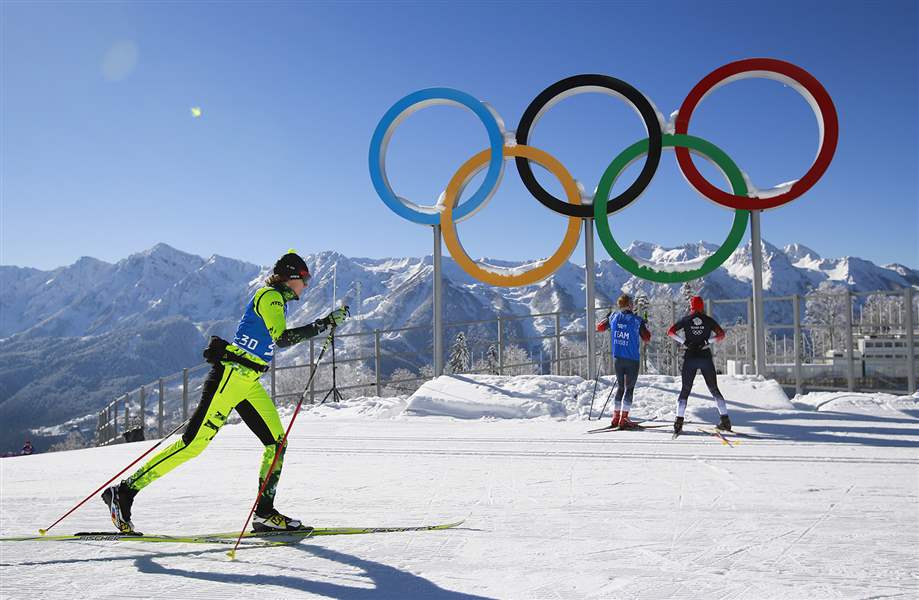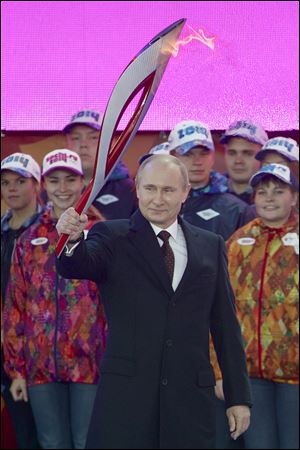
Putin’s massive gamble
Terrorism, politics cloud Russia’s expensive showcase
2/3/2014
An athlete skis in front of the Olympic rings at the skiing and biathlon center in Polyana, Russia. The Games open on Friday.
ASSOCIATED PRESS

An athlete skis in front of the Olympic rings at the skiing and biathlon center in Polyana, Russia. The Games open on Friday.
MAGNITOGORSK, Russia — Sitting on the Black Sea, Sochi has always been known for its relative warmth, a quality that only encouraged Russian President Vladimir Putin to turn an ornate palace there into his own version of Camp David.

Russian President Vladimir Putin was responsible for bringing the Games to Sochi. He has spent $51 billion on infrastructure.
But seven years ago, when the International Olympic Committee awarded the 2014 Winter Games to the resort town, even Putin, with his personal knowledge of the climate, could not have expected the kind of heat that is accompanying the event’s arrival.
Putin’s Olympics — the first in Russia since the collapse of the Soviet Union and the end of the Cold War — are now just days away from the opening ceremony on Friday. But the talk is not of his country’s swift economic emergence during the past decade or the chances of the Russian national ice hockey team winning its first Olympic gold medal in the post-Soviet era, but of “black widow” suicide bombers at large in the region, gay rights violations, and his diminishing domestic approval rating.
Politics traditionally have served as a backdrop for the games, but never before has a leader’s legacy been so tied to what happens in the Olympics. Of course, even if Putin did know that hosting the games could backfire on him, it’s quite possible the man who has been president of the Russian Federation since 1999 simply did not care.
After all, Putin did not rise to lieutenant colonel of the Russian KGB before his jump to politics because he did not enjoy a good fight. This time, in getting his country ready for the Olympics, his haymakers have been fists filled with billions upon billions of rubles. Among other things, that money has paid for a new power plant, a new ski resort, an Olympic stadium, an ice hockey arena, and miles of new roads and rail lines and their attendant bridges and tunnels. The budget, originally set around $12 billion, has ballooned to $51 billion, and questions have been raised about just how many of Putin’s friends and backers have benefited along the way.
As concerns of terrorist activity around Sochi and the adjacent North Caucasus region have increased in recent months, the answer has been to hire more security. A record 60,000 gun-toting personnel are expected in Sochi between the coastal cluster of venues and the mountain cluster, and air traffic will be limited as the games are played.
Some would argue it was not Putin’s job to foresee all of these issues but the IOC’s. The last time the Olympics were in Russia, for the 1980 Moscow Summer Games, the country was still the Soviet Union, and the United States led a boycott of the event in protest of the Soviets’ invasion of Afghanistan. It could be argued that Moscow at that time would have been a safer locale than Sochi today, a stroke of irony that the United States Olympic Committee has to live with as 230 American athletes bring themselves and their families to Russia.
Is Putin’s country ready to host an event of this magnitude? There’s only one way to find out.
“A well-run Olympics will not do as much good as a badly run Olympics will harm them,” said Richard Pipes, a professor emeritus of history at Harvard University and an expert on Russian history. “If there is no terrorism, it will mean that Russia is an orderly country, and that’s good for them. But terrorist attacks, where foreigners are killed, it would be very damaging, and that’s something they want desperately to avoid. It would mar their self-image and their image abroad.”
For Putin, the Olympics were a calculated risk. How do you stimulate the economy and create job opportunities in areas as remote as Sochi in a country that spans nine time zones? You play your hand hard and hope it works out.
“It is one of the most significant development projects that Russia has engaged in under Putin,” said Samuel Charap, senior fellow for Russia and Eurasia at the International Institute for Strategic Studies in Washington, “and his method of dealing with the problem that Russia faces in its far-flung regions, of the wealth not trickling down or spreading out from major metropolitan areas, is they do big projects.
“In the North Caucasus region, there’s a particular sensitivity because of the ongoing separatist issue and the history of civil war there in the post-Soviet period. It’s an attempt to try to use the means of having to build all this infrastructure there to create a tourist economy in that part of the country. And the sense you get with Putin is that things don’t get done otherwise, and even if there’s going to be corruption involved, the alternative is sitting on his hands.”
The North Caucasus is made up of seven national republics — Adygeya, Dagestan, Ingushetia, Karachay-Cherkessia, Kabardino-Balkaria, North Ossetia, and Chechnya. The growth of radical Islam in the region has been spurred by rampant poverty and unemployment, and jihadist groups are becoming more organized.
According to the Russia Direct Quarterly Report, in 2012 armed violence in the North Caucasus region resulted in 1,225 casualties (700 killed and 525 injured). Jihadists stretched their attacks beyond the region to the Nevsky Express rail service between Moscow and St. Petersburg in 2009, the Moscow metro in 2010, Domodedovo Airport in 2011, and a Volgograd bus in 2013.
On Jan. 24, the U.S. State Department issued a warning to all travelers to Russia, informing them of the media reports of possible “black widow” suicide bombers in Sochi and of threats made by Doku Umarov, the head of the Caucasus Emirate.
The release added: “In January, 2014, another video was released by a radical Islamist group claiming responsibility for the Volgograd bombings and promising a ‘present for tourists’ in connection with the Olympic Games in Sochi.”
With the situation being this volatile, the Sochi Olympics could be considered a success if it ends without a terrorist attack.
“There were the same worries when talking about the London Olympics,” said Russian hockey player Sergei Gonchar of the Dallas Stars. “It’s just the world that we’re living in right now. It doesn’t matter what city it is, what country it is. There’s always going to be that worry in the back of your mind. It’s just a new reality, and I’m sure people back home are going to do everything to make sure nothing is happening.”
Adding to the international angst against Putin and Russia is the law passed in June, 2013, banning the “propaganda of nontraditional sexual relations” to minors. The law makes it a crime to promote equality for the lesbian, gay, bisexual, and transgender communities in public, and foreign citizens could face up to 14 days in jail and deportation.
“They had no idea what they were getting into when they passed this law last year,” Charap said. “They miscalculated, to put it mildly. It was a stupid law, and it shouldn’t have passed, and they’re paying the price for it, as well they should.
“There’s certainly more negative press surrounding the games than they’d hope for. I have to imagine that they had relatively limited expectations about the Olympics being some sort of breakthrough internationally for the country as a whole. The question is what the games will do politically and economically for Putin domestically.”
The Block News Alliance consists of The Blade and the Pittsburgh Post-Gazette. J. Brady McCollough is a reporter for the Post-Gazette.